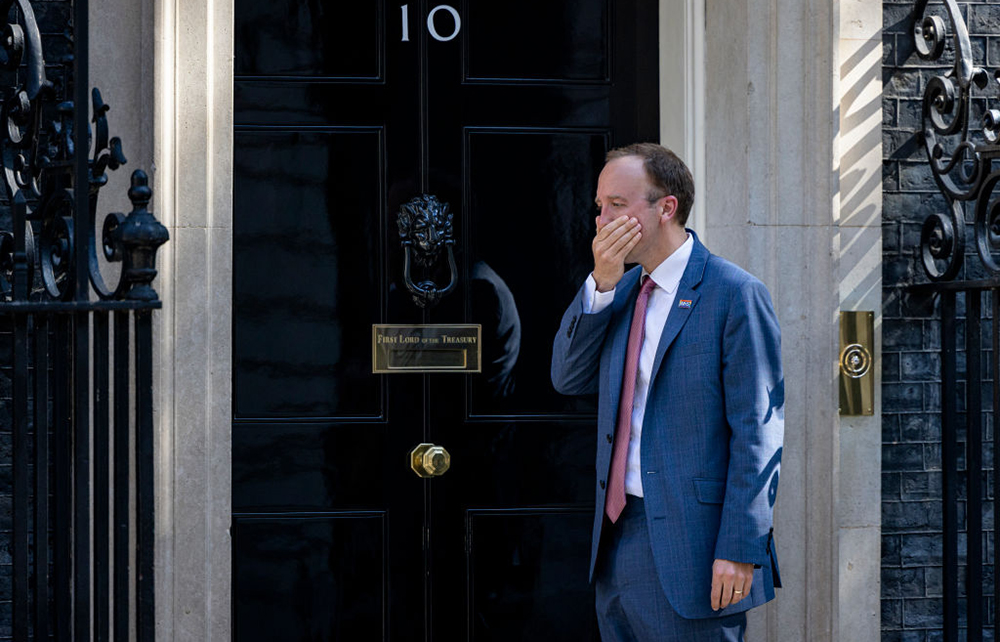Last summer, Rishi Sunak told this magazine about what happened inside government during lockdown. The policy, he said, had been pursued with little consideration of the drawbacks. To even discuss the impact of lockdown – to acknowledge the damage being done to schools or NHS waiting lists – was seen as treachery. At the time, Sunak’s testimony was said to be an exaggerated ploy at the end of a bruising Tory leadership campaign. This week, documents have emerged that prove that government lockdown discussions were even worse than Sunak said.
The health secretary created a record of the modus operandi of a government in crisis
Seldom do journalists come into possession of such rich material as the texts that are now in the hands of the Daily Telegraph. As health secretary, Matt Hancock was involved in all the important discussions, often taking place over the messaging service WhatsApp. The technology is encrypted and unhackable. This led to an unprecedented degree of candour; Michael Gove, Boris Johnson, and Chris Whitty all shared classified documents and made big decisions in text form via their phones. None worked out that while the messages couldn’t be hacked, they could be leaked instantly if any member of the group chose to pass them on to journalists.
‘Let’s use this when we need to move fast,’ said Hancock in one of the higher-powered WhatsApp groups he set up, whose members included Mr Johnson, ‘so we’re all on the same page at all times’. In doing so, he created a record of the modus operandi of a government in crisis.
Hancock needed a ghostwriter for his memoirs, so handed over all the private discussion threads, 2.3 million words in all, to the journalist Isabel Oakeshott. She duly ghosted his Pandemic Diaries but then decided, on balance, that these documents should be placed in the public domain. She felt, rightly, that those who had been locked down should be able to understand the reasoning behind those decisions. Too often, the messages reveal a lack of serious evidence.
We have already seen that Hancock over-ruled advice to test everyone coming into care homes (instead testing only those who were admitted from hospital), saying it would be ‘muddying the waters’ to take such a broad approach.
The Daily Telegraph is planning many further disclosures. We will see how restrictions on schoolchildren were put in place simply to avoid political confrontations. We will see how the isolation rules, which had such a devastating effect on the economy, could have been lifted sooner. And we will see how a gung-ho, pro-lockdown culture set in within government – while those who asked difficult questions or resisted were treated as the enemy. The messages, taken together, offer a case study of how tribal groupthink can set in when there is no scrutiny or transparency and normal parliamentary debate is suspended.
Hancock says that an inquiry, not a newspaper, is the best forum for this. But the official Covid inquiry is moving so slowly that it is beginning to look like a cover-up. The glacial pace at which it is proceeding means that it could take years and may ultimately fail to address the question of whether, on balance, lockdown was worth it. The report on the swine flu outbreak took a matter of months. The Covid inquiry could end up taking the best part of a decade.
The Hancock files prove that Sunak was right: huge decisions were made with scandalously little consideration of their wider effects. Sunak is now Prime Minister – so why has he left in place a system that he knows is failing? The Sage committee, for example, was set up as a pool of technical experts to give advice. Yet they ended up being co-opted as lockdown advocates. Often they made the case for lockdown using graphs drawn up on the basis of nonsensical assumptions. These false assumptions were exposed when the cabinet rebelled and rejected lockdown in December 2021. What Sage had projected would happen had failed to occur.
Senior Sage figures, rather than being questioned over how they managed to serve up junk advice to ministers, have instead been garlanded and promoted. The co-chair of the Sage modellers, Angela McLean, has just been named the new chief scientific adviser. How can anyone expect lessons to be learned next time around?
Sunak knows better than most what horrors are waiting to be uncovered by the inquiry and, while he may be personally vindicated, the unvarnished truth is unlikely to do the Tories any favours. It may be in the interests of his party that the inquiry is delayed until after the election, but it’s not
in the interests of the country.
As we have learned, nothing harms a society more than forcibly closing it down. That’s why the official Covid inquiry needs to have a deadline: a year should be more than enough, with parallel hearings if necessary. The costs of lockdown ran into hundreds of billions; the cost of learning lessons in time for the next pandemic will be trifling by comparison.
This lack of urgency suits politicians and advisers who are reluctant to account for their actions. It allows them to dodge questions by saying ‘wait for the inquiry’, knowing that this will be years away.
The evidence we have, however, is from the perspective of one man and it will only provide one part of the story. It is high time for Covid inquiry to provide the rest.






Comments